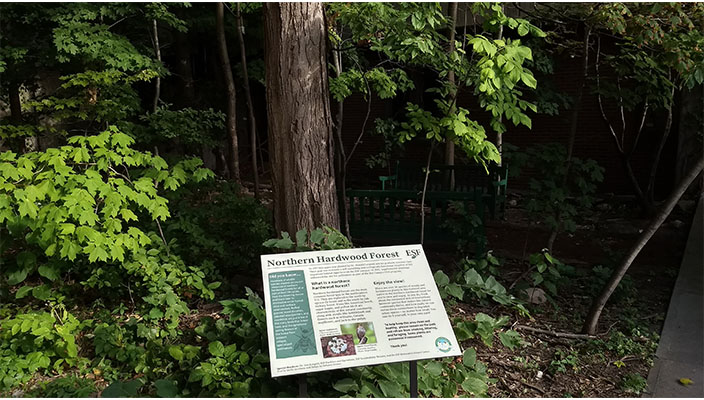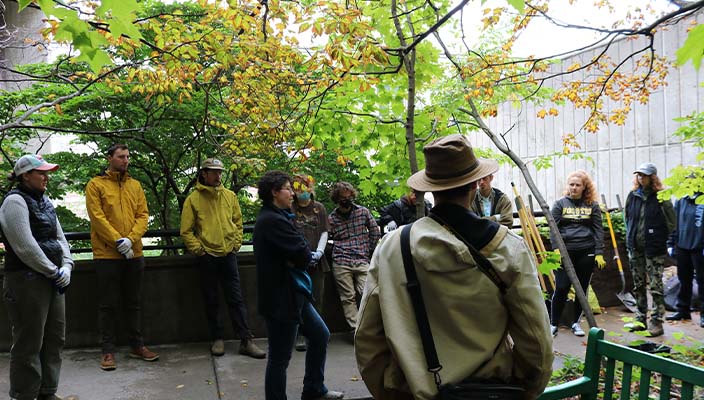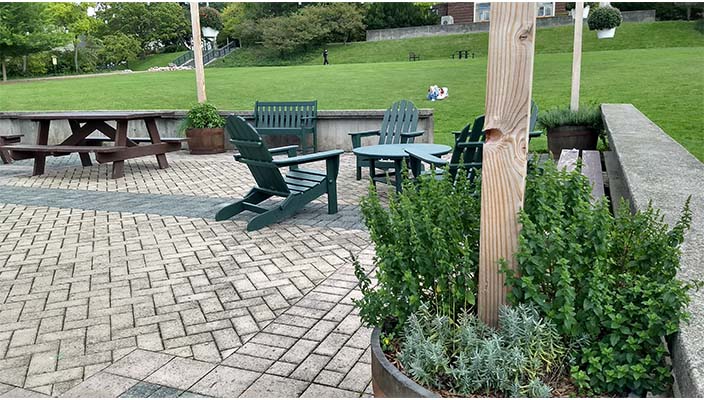Bee Campus USA
ESF became a Bee Campus USA affiliate in April 2022. The joint Bee Campus USA and Bee City USA programs are initiatives of the Xerces Society and are comprised of universities and cities across America that have pledged to protect wild pollinators and the critical services that they provide to our planet. ESF has established a standing Bee Campus Committee as part of its program.
This Committee will continually plan and lead volunteer planting opportunities on campus to expand pollinator habitat. It will also create and adopt an integrated pest management plan designed to reduce and/or negate the use of pesticides on campus. The use of pesticides on campus is already restricted to invasive and potentially harmful species removal, but this plan will formalize a long-standing operational practice. The Bee Campus Committee will also work with faculty members to offer and expand coursework and continuing education opportunities that incorporate pollinator conservation. The Committee has updated educational signage on campus and will continue to do so as habitat expands.
The Bee Campus Committee is comprised of faculty, students, and staff. The team meets quarterly to plan pollinator habitat improvement projects and outreach/engagement activities. The Committee is also committed to supporting ESF’s Nature Positive Universities commitment. If you would like to work with or join the Bee Campus Committee reach out to Molly or Sue.
Committee Membership:
Molly Jacobson, Native Pollinator Ecologist (Co-Chair)
Sue Fassler, Director of Sustainable Operations (Co-Chair)
Dr. Don Leopold, Distinguished Teaching Professor, Department of Environmental Biology
Paige Chesshire, Postdoctoral Associate
Dr. Catherine Landis, Postdoctoral Associate
Olivia Kurz, PhD Candidate, Conservation Biology
Sam Lasher, Undergraduate Student
Rachel Reycroft, Undergraduate Student
Jess Proctor, Graduate Student
Josh Serpe, Graduate Student
Michael Vargason, Grounds Supervisor
Teaching Students and the Public about Pollinator Conservation
A major goal of Bee Campus is to broaden pollinator conservation efforts beyond ESF’s campus, through community engagement. Bee Campus has hosted on and off-campus events to promote awareness of New York’s native pollinators, including moth blacklighting nights for National Moth Week, Earth Week pollinator trivia, educating elementary school groups (with real bees!), tabling at the New York State Fair, leading tours of the Gateway Center’s green roof, offering technical assistance for external planting projects, and more. Molly our pollinator ecologist frequently gives talks in ESF courses and in many locations across the northeast, as well as through online webinars. See the “Media” section below for links to local news interviews about Bee Campus activities.

Bee Campus also partnered with the Division of Student Affairs to include Bee Campus messaging and education into their annual Saturday of Service project. This event brings first year ESF students into the surrounding community to engage in service projects. In fall 2023, students performed general park maintenance and invasive species removal at seven county, state, and local parks.
Bee Campus also has a campus pollinator inventory on the citizen science platform iNaturalist, where you can submit your sightings of pollinators at ESF.
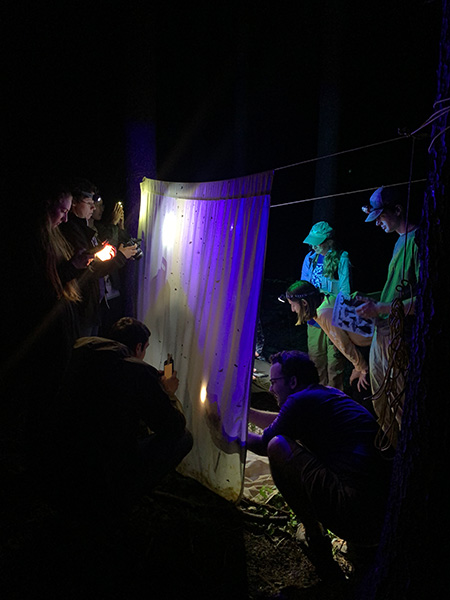
Media
- Leave Falling Leaves Alone, Ecologist Says
- Syracuse Speaks – Biodiversity in Central New York
- Bees, Trees and, the Human Spirit (created by ESF student, Eden Gardner)
- New pollinator garden planted at SUNY ESF, supporting bees, butterflies
- ESF garden gives bees, butterflies a boost on their way out of town
- ESF Becomes an Affiliate of Bee Campus USA
- SUNY ESF is on its way to improving its pollinator-friendly environment on campus
Native Plant Recommendations
Native Plant Suppliers and Recommended Plants
Campus Pollinator Habitat
Actively Creating Habitat on Campus
Hundreds of the native plants used in the Bee Campus plantings featured below have been grown right here on the ESF campus by Molly Jacobson. They were grown in the Illick greenhouses and will help to promote local ecotypes of native species for use in landscaping.
Northern Hardwood Forest Restoration
During Earth Week 2022, the Bee Campus led its first campus planting and engaged students, faculty, and staff in enhancing the long-standing Northern Hardwood Forest restoration area near Illick Hall. Several woodland wildflowers that offer important pollen and nectar sources for spring-flying bees were added. A second supplemental planting took place in the fall. A redesigned interpretive sign (below) and plant identification signs were installed in Fall 2022.
Robin Hood Oak Pollinator Garden
Bee Campus also led the replanting of campus landscape beds located by the Robin Hood Oak during the Fall of 2022. Members of the campus community volunteered to plant approximately 180 plants (of 27 species) in the revamped garden, which has been certified as a national monarch waystation by Monarch Watch. Molly Jacobson, Native Pollinator Ecologist, designed this new showpiece, and several more species have been added since the initial planting. Interpretive and species identification signage were installed in fall 2023. In addition, invasive Phragmites reed was removed by Grounds team in the swale adjacent to the garden in summer 2023, allowing native wetland plants to be added and expanding the garden.
Quad Wildflower Meadow
In spring 2024, the turfgrass slope in front of Bray Hall was cleared and reseeded as a native wildflower meadow, which will provide floral resources, host plants, and shelter for a diversity of pollinators. Over 55 species of northeast native flowers and grasses were custom-chosen for their suitability for this site and their complementary value to pollinators. Seeds were sourced from Ernst Conservation Seeds and from wild collected seed, comprising regional ecotypes that ensure a good match for our climate and growing conditions. Native meadows are dynamic and the campus community will have the chance to observe this new meadow as it grows and matures over the course of several years, with each season bringing something new to discover. The meadow will offer countless opportunities for education and research, and is the latest pollinator habitat patch in the growing connective corridor through our campus. This project was made possible with the expertise of biologist Sam Quinn, who runs ESF’s Lawn to Meadows Program. Visit the Lawn to Meadows website to learn more about the meadow creation process, its benefits, and how you can make a meadow in your own yard.


Illick Hall Landscape Beds
Members of the Bee Campus Committee joined the Office of Sustainable Facilities & Operations and the Office of Sustainability in an interdisciplinary effort to design a series of unique and pollinator friendly landscaping beds, which were planted along the north side of Illick Hall in fall 2023. These landscape beds are characterized by a harsh microclimate. Substantial shading, salt from deicing operations, and heavy winds further challenge species planted in this area.
Plants selected for these beds can be found on the northernly exposed vegetated regions of the Adirondack and Catskill Mountains. Some of the plants found in the new beds include: Cornus rugosa (round-leaved dogwood), Diervilla lonicera (northern bush honeysuckle), Eurybia divaricata (white wood aster), Solidago caesia (blue-stemmed goldenrod), and Tiarella cordifolia (heartleaf foamflower).
Boulders representative of local and regional geology and fallen logs create a habitat distinct from traditional manicured landscape beds.
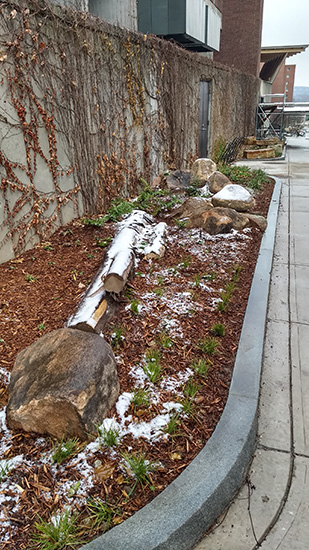
Campus Drive Pollinator Garden
In fall 2023, over 500 native plants were installed by students and staff in the landscaping bed along Campus Drive, behind Moon Library. These native species were specifically chosen to represent natural communities found on dry, poor soils in the northeast, resulting in a unique selection of plants not commonly found in landscaping. This garden will foster ecological, teaching, and aesthetic value for this well-trafficked road cutting through campus.
Edible Landscapes

